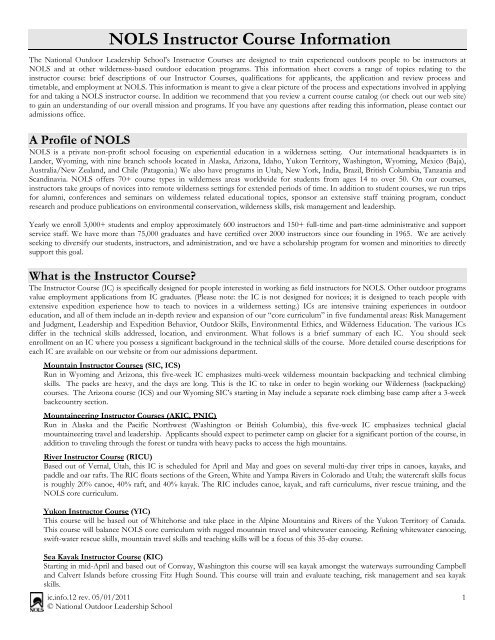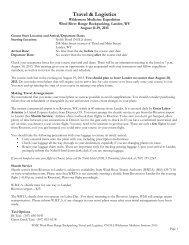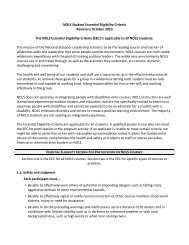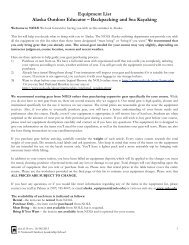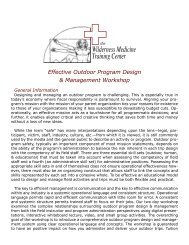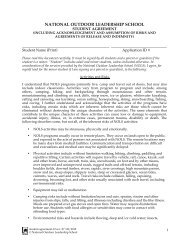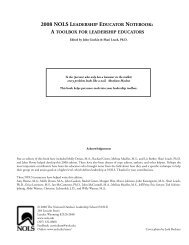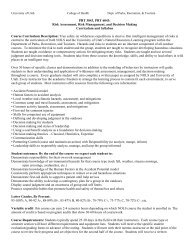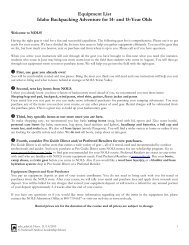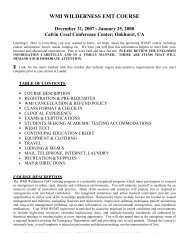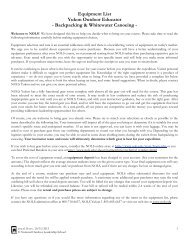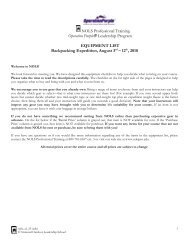NOLS Instructor Course Information
NOLS Instructor Course Information
NOLS Instructor Course Information
You also want an ePaper? Increase the reach of your titles
YUMPU automatically turns print PDFs into web optimized ePapers that Google loves.
<strong>NOLS</strong> <strong>Instructor</strong> <strong>Course</strong> <strong>Information</strong><br />
The National Outdoor Leadership School’s <strong>Instructor</strong> <strong>Course</strong>s are designed to train experienced outdoors people to be instructors at<br />
<strong>NOLS</strong> and at other wilderness-based outdoor education programs. This information sheet covers a range of topics relating to the<br />
instructor course: brief descriptions of our <strong>Instructor</strong> <strong>Course</strong>s, qualifications for applicants, the application and review process and<br />
timetable, and employment at <strong>NOLS</strong>. This information is meant to give a clear picture of the process and expectations involved in applying<br />
for and taking a <strong>NOLS</strong> instructor course. In addition we recommend that you review a current course catalog (or check out our web site)<br />
to gain an understanding of our overall mission and programs. If you have any questions after reading this information, please contact our<br />
admissions office.<br />
A Profile of <strong>NOLS</strong><br />
<strong>NOLS</strong> is a private non-profit school focusing on experiential education in a wilderness setting. Our international headquarters is in<br />
Lander, Wyoming, with nine branch schools located in Alaska, Arizona, Idaho, Yukon Territory, Washington, Wyoming, Mexico (Baja),<br />
Australia/New Zealand, and Chile (Patagonia.) We also have programs in Utah, New York, India, Brazil, British Columbia, Tanzania and<br />
Scandinavia. <strong>NOLS</strong> offers 70+ course types in wilderness areas worldwide for students from ages 14 to over 50. On our courses,<br />
instructors take groups of novices into remote wilderness settings for extended periods of time. In addition to student courses, we run trips<br />
for alumni, conferences and seminars on wilderness related educational topics, sponsor an extensive staff training program, conduct<br />
research and produce publications on environmental conservation, wilderness skills, risk management and leadership.<br />
Yearly we enroll 3,000+ students and employ approximately 600 instructors and 150+ full-time and part-time administrative and support<br />
service staff. We have more than 75,000 graduates and have certified over 2000 instructors since our founding in 1965. We are actively<br />
seeking to diversify our students, instructors, and administration, and we have a scholarship program for women and minorities to directly<br />
support this goal.<br />
What is the <strong>Instructor</strong> <strong>Course</strong>?<br />
The <strong>Instructor</strong> <strong>Course</strong> (IC) is specifically designed for people interested in working as field instructors for <strong>NOLS</strong>. Other outdoor programs<br />
value employment applications from IC graduates. (Please note: the IC is not designed for novices; it is designed to teach people with<br />
extensive expedition experience how to teach to novices in a wilderness setting.) ICs are intensive training experiences in outdoor<br />
education, and all of them include an in-depth review and expansion of our “core curriculum” in five fundamental areas: Risk Management<br />
and Judgment, Leadership and Expedition Behavior, Outdoor Skills, Environmental Ethics, and Wilderness Education. The various ICs<br />
differ in the technical skills addressed, location, and environment. What follows is a brief summary of each IC. You should seek<br />
enrollment on an IC where you possess a significant background in the technical skills of the course. More detailed course descriptions for<br />
each IC are available on our website or from our admissions department.<br />
Mountain <strong>Instructor</strong> <strong>Course</strong>s (SIC, ICS)<br />
Run in Wyoming and Arizona, this five-week IC emphasizes multi-week wilderness mountain backpacking and technical climbing<br />
skills. The packs are heavy, and the days are long. This is the IC to take in order to begin working our Wilderness (backpacking)<br />
courses. The Arizona course (ICS) and our Wyoming SIC’s starting in May include a separate rock climbing base camp after a 3-week<br />
backcountry section.<br />
Mountaineering <strong>Instructor</strong> <strong>Course</strong>s (AKIC, PNIC)<br />
Run in Alaska and the Pacific Northwest (Washington or British Columbia), this five-week IC emphasizes technical glacial<br />
mountaineering travel and leadership. Applicants should expect to perimeter camp on glacier for a significant portion of the course, in<br />
addition to traveling through the forest or tundra with heavy packs to access the high mountains.<br />
River <strong>Instructor</strong> <strong>Course</strong> (RICU)<br />
Based out of Vernal, Utah, this IC is scheduled for April and May and goes on several multi-day river trips in canoes, kayaks, and<br />
paddle and oar rafts. The RIC floats sections of the Green, White and Yampa Rivers in Colorado and Utah; the watercraft skills focus<br />
is roughly 20% canoe, 40% raft, and 40% kayak. The RIC includes canoe, kayak, and raft curriculums, river rescue training, and the<br />
<strong>NOLS</strong> core curriculum.<br />
Yukon <strong>Instructor</strong> <strong>Course</strong> (YIC)<br />
This course will be based out of Whitehorse and take place in the Alpine Mountains and Rivers of the Yukon Territory of Canada.<br />
This course will balance <strong>NOLS</strong> core curriculum with rugged mountain travel and whitewater canoeing. Refining whitewater canoeing,<br />
swift-water rescue skills, mountain travel skills and teaching skills will be a focus of this 35-day course.<br />
Sea Kayak <strong>Instructor</strong> <strong>Course</strong> (KIC)<br />
Starting in mid-April and based out of Conway, Washington this course will sea kayak amongst the waterways surrounding Campbell<br />
and Calvert Islands before crossing Fitz Hugh Sound. This course will train and evaluate teaching, risk management and sea kayak<br />
skills.<br />
ic.info.12 rev. 05/01/2011<br />
© National Outdoor Leadership School<br />
1
Sailing <strong>Instructor</strong> <strong>Course</strong> (BSIC)<br />
Our Mexico Branch near Mulege on the Gulf of California, Baja California Sur, hosts this IC in late November. The program uses 20foot<br />
Drascombe longboats. This 35-day course is designed to help competent sailors refine their risk management, sailing and teaching<br />
skills to fit into the <strong>NOLS</strong> educational philosophy.<br />
<strong>Instructor</strong> <strong>Course</strong> For Experienced Professionals (PIC)<br />
Each May and September, we run this course in Wyoming. We use this course to train staff with extensive wilderness-based<br />
experience from other outdoor programs to work for <strong>NOLS</strong>. It emphasizes wilderness backpacking and climbing/mountaineering<br />
skills. The minimum requirements are that you are 25 years of age, have a WFR or EMT certification, have significant personal<br />
experience, and have worked at least 50 weeks on extended wilderness trips as a professional educator. There is a separate application packet for<br />
the PIC, so please be sure to request it if you meet these qualifications. Contact the <strong>NOLS</strong> admission office for more information.<br />
Qualifications for Applicants<br />
<strong>NOLS</strong> was founded to develop expedition leaders and responsible wilderness users. Our faculty lies at the very heart of this mission. We<br />
attract enthusiastic women and men who are not only technically skilled, but whose focus is on teaching wilderness skills and leadership to our students. Admission<br />
to the <strong>Instructor</strong> <strong>Course</strong> is a selective process. We look at an applicant’s overall experience, skills and past performance in making our<br />
selections for the <strong>Instructor</strong> <strong>Course</strong>s.<br />
Age: Minimum is 21 at the start of your course. (IC participants average 27 years old, and <strong>NOLS</strong> field staff average 32.)<br />
Medical Training:<br />
• You must possess current CPR and Wilderness Medicine certification meeting our minimum standard (see below.)<br />
• Both certifications must expire after August 31 of the year in which you take the IC. If your certifications will expire before then,<br />
a letter confirming enrollment in a recertification course is required with your application.<br />
• If you are not certified at our minimum standard, a letter confirming enrollment in such a course, to be completed (and<br />
certification received) prior to the start of the IC to which you are applying, is required with your application.<br />
• Our minimum standard: a wilderness medicine certification for at least 72 hours of instruction.<br />
• We prefer Wilderness First Responder (WFR) certification or Wilderness Emergency Medical Technician (W-EMT) certification<br />
from the Wilderness Medicine Institute.<br />
• The Wilderness Medicine Institute (WMI) is an institute of <strong>NOLS</strong>. We offer courses throughout the Rockies and Western<br />
U.S., and in several other countries. If you are in need of a wilderness medicine course, please check our schedule at<br />
http://www.nols.edu/wmi.<br />
• Urban emergency response or first responder certification are not sufficient for working as a <strong>NOLS</strong> instructor, as they do not train<br />
you to implement the <strong>NOLS</strong> Field Treatment Protocol. WMI does provide a Wilderness Upgrade for the Medical Professional<br />
course (54 hours), which converts an EMT certification to W-EMT and an Urban First Responder to WFR.<br />
• Contact the <strong>NOLS</strong> admission office if you have questions, at 800-710-6657.<br />
Travel and Camping:<br />
You must have solid backcountry navigation, travel, and camping skills. These should be based on extensive wilderness experience in<br />
varied environments. Almost all IC participants have led extended wilderness trips with other organizations before they apply to an IC.<br />
Conservation and Leave No Trace habits must be impeccable.<br />
Personal Expeditioning:<br />
Personal trips and expeditions give you the experience to plan, organize and successfully carry out trips without institutional support<br />
and guidance. They also reflect a personal commitment to exploring and enjoying the wilderness on your own. Experience on trips of<br />
two weeks or longer is desirable because it begins to approach the duration and feel of long expeditionary <strong>NOLS</strong> courses.<br />
Teaching, Leadership, and Communication:<br />
<strong>Instructor</strong> candidates must possess and model maturity and effective group interaction skills with peers and students alike. You must<br />
be both conversant in and able to write effectively in English. You must have a strong desire to teach and lead novices, who make up<br />
the majority of students in outdoor education. We are looking for demonstrated teaching and leadership experience - most applicants<br />
have previous experience (one or more seasons) in positions where they have professionally taught, and/or led outdoor trips. The<br />
more this experience involves being on extended wilderness trips, the more relevant and valuable that it is.<br />
Risk Management and Judgment:<br />
Our instructors take groups of novices into remote wilderness settings for extended periods of time. You must have experience in the<br />
recognition and evaluation of potential hazards and in making sound judgments based on safety priorities. You also must have<br />
experience in managing individuals and groups and in understanding their abilities and limitations as well as your own. You need to be<br />
in excellent physical condition and have enough skill and energy to help others during travel through difficult terrain, in challenging<br />
weather, over long tiring days.<br />
ic.info.12 rev. 05/01/2011<br />
© National Outdoor Leadership School<br />
2
Technical Skills Required/ Desired<br />
Mountain ICs:<br />
• You must have extensive (7+ continuous days at a time) off-trail/wilderness/mountain backpacking and camping experience. Some<br />
of this experience should be in very remote places, some should be at high altitude (above treeline/10,000+ ft), and ideally some<br />
should be in the mountains of the western U.S.<br />
• The ability to set-up and supervise a top rope climbing situation is highly desired.<br />
• The ability to lead and supervise novice climbers in 4th and 5th class terrain is desired: technical rope and protection system skills to<br />
set up fixed ropes, running belays, and other technical aids to travel are desired.<br />
• For applicants seeking to work technical climbing courses:<br />
• You must feel comfortable lead climbing traditionally protected multi pitch climbs at a 5.6 (or above) level.<br />
• High angle rescue skills (hauling, escaping a belay, tandem rappels, etc.) are highly desired.<br />
Mountaineering ICs:<br />
• You must possess extended wilderness travel and living skills, equal to those outlined for Mountain IC’s.<br />
• You must have experience with technical mountaineering skills and systems, i.e. ice axe travel and rope team travel.<br />
• Glacier camping experience is highly desired.<br />
River IC:<br />
• You must have extensive canoe, raft and/or kayak instruction or guiding experience.<br />
• You must be a solid Class III kayaker and rafter, and Class IV kayaking and rafting experience is desired.<br />
• You must be a solid Class II tandem open canoe boater (OC2), and Class III OC2 skills are desired.<br />
• You must have some multi-day wilderness river experience, and extensive experience is highly desired.<br />
• Swiftwater/Whitewater Rescue training and certification is desired.<br />
Sea Kayak IC:<br />
• You must be personally experienced in conditions up to 15-knot winds and 3-ft waves on all points of paddle.<br />
• You must have extensive sea kayak instruction or guiding experience; cold- water and or open coast paddling experience is desired.<br />
• You must have familiarity with surf landing procedures and the ability to negotiate mild surf landings (
Common Questions:<br />
• What if I'm just starting out in outdoor education?<br />
The information provided in this letter is designed to aid you in evaluating your own qualifications for the <strong>Instructor</strong> <strong>Course</strong> (IC). If you<br />
are interested in becoming a <strong>NOLS</strong> instructor as your first step in pursuing work in outdoor education, chances are your skills and<br />
experience are inadequate for selection. You might first consider a <strong>NOLS</strong> Outdoor Educator course or one of our more technical skill<br />
courses such as mountaineering. If you are interested in a <strong>NOLS</strong> course in order to pursue an outdoor education career elsewhere, we<br />
recommend you consider our Outdoor Educator or Trip Leader courses.<br />
• Are <strong>NOLS</strong> graduates favored over non-grads?<br />
No. Although about 50% of our IC participants are <strong>NOLS</strong> graduates, anyone with a solid outdoor resume and excellent references is<br />
invited to apply. It is important to note that graduation from a <strong>NOLS</strong> course alone is not adequate background for an instructor course,<br />
and graduates accepted on an IC have additional experience.<br />
• What determines whether I pass the <strong>Instructor</strong> <strong>Course</strong> and am recommended for hire at <strong>NOLS</strong>?<br />
Your performance and evaluation. Your instructors, senior <strong>NOLS</strong> field staff, evaluate your performance throughout the course. Feedback<br />
is ongoing and focuses on your ability to perform technical skills to acceptable standards, your ability to function as a group member and<br />
effectively lead your peers, your teaching skills, and your overall competence as an outdoor educator. You receive an extensive written<br />
evaluation covering all areas at the conclusion of the IC.<br />
• Which <strong>Instructor</strong> <strong>Course</strong> should I take?<br />
A <strong>NOLS</strong> <strong>Instructor</strong> <strong>Course</strong> (IC) is intended as a place for you to demonstrate existing wilderness living and travel skills, and refine your<br />
group leadership abilities. You should apply for an IC in a discipline where you already possess a wealth of experience. An <strong>Instructor</strong><br />
<strong>Course</strong> is not intended as a place to learn new technical skills. We want you to be learning new tricks and techniques for teaching these<br />
skills to novices, not learning to perform skills for the first time.<br />
• What are my opportunities for work after completing the <strong>Instructor</strong> <strong>Course</strong>?<br />
Over the 2007 and 2008 seasons, all IC graduates who had open availability were offered summertime work for <strong>NOLS</strong>. There are typically<br />
opportunities for graduates of the April, May, and June ICs to work during the same summer as their IC, although many graduates wait to<br />
begin their <strong>NOLS</strong> careers until the following summer season (one year after their IC). 2009 was a more challenging year for work due to<br />
the economy. As a result only about half of the IC graduates were able to work immediately after their IC in the same summer. In 2010, all<br />
IC graduates who had summer availability received field contracts with <strong>NOLS</strong>. We expect the same to occur in 2011.<br />
“Off-season” work in the fall, winter, and spring seasons is offered to our more senior instructors first. Most new instructors work two<br />
summer seasons prior to receiving regular “off-season” work. Individuals with outstanding experience or potential may have the<br />
opportunity to start “off-season” work sooner. All instructors are asked to work during the summer to be considered for off-season work.<br />
Sometimes new staff members who have flexible schedules are able to accept late-notice fieldwork opportunities that come up during the<br />
off-season. Additionally, some field staff combine in-town support work with field instruction.<br />
• Is it possible to work for <strong>NOLS</strong> in the summer only?<br />
Yes. Because the majority of our courses occur in June, July, and August, there is a strong need for experienced instructors in that season.<br />
Many <strong>NOLS</strong> instructors are professionals in other jobs and are only able to work one or two courses a year in their specialty area. Some<br />
instructors are students in the off-season. <strong>Instructor</strong>s with summer-only schedules are an important part of our faculty.<br />
• Can I apply for the <strong>Instructor</strong> <strong>Course</strong> without paying the $65 registration fee? I intend on applying for a scholarship and<br />
would probably need one to attend.<br />
Due to the extremely large number of applicants we have, we require that applicants pay when applying in order to demonstrate their<br />
commitment and intent to attend if selected. When an IC applicant is notified of acceptance to the IC, he or she is also offered a<br />
scholarship, if applicable. The scholarship reduces the amount of tuition due.<br />
• What are the wages and benefits for instructors?<br />
Wages are based on seniority and position. Most new staff will work their first course in a training position earning $74/day although some<br />
IC graduates may qualify to start at $82/day. As staff move through the initial training role and gain experience, wages quickly increase.<br />
Field staff wages are typically raised across the board each year, and an individual instructor’s wages increase at regular seniority intervals.<br />
Extensive experience with other organizations typically bumps your starting wages as well. Our most senior faculty earn about $192/day<br />
when they work as the head instructor on a course. Health insurance benefits are offered for those working 15 weeks or more per year. In<br />
addition, travel allowances, subsidized training opportunities, equipment pro-purchase benefits, and family discounts for courses are all<br />
available.<br />
ic.info.12 rev. 05/01/2011<br />
© National Outdoor Leadership School<br />
4
• Why is the <strong>Instructor</strong> <strong>Course</strong> so expensive?<br />
A <strong>NOLS</strong> <strong>Instructor</strong> <strong>Course</strong> (IC) is an extended expedition. Expeditions are expensive to put together, and while 97% of IC participants<br />
successfully graduate ready for hire by <strong>NOLS</strong>, only about 70% of IC graduates actually come to work for us. Many participants use the<br />
<strong>NOLS</strong> IC to springboard their outdoor career forward in other outdoor leadership or outdoor recreation jobs, so we still have to charge<br />
tuition for the instructor course. In 2011 we gave away nearly $200,000 in scholarships for instructor courses. 75% of IC participants<br />
asked for a scholarship, and 100% of applicants who asked for financial assistance received some form of support from <strong>NOLS</strong>. For 2011,<br />
awards ranged from $1,000 to full tuition (though full tuition scholarships are reserved for international applicants).<br />
• What are the career opportunities at <strong>NOLS</strong>?<br />
The employment possibilities offered by <strong>NOLS</strong> allow tremendous flexibility. A number of our instructors have maintained professional<br />
non-<strong>NOLS</strong> careers while working for <strong>NOLS</strong> as their schedule allows. Others have been at the school for years and work year-round in the<br />
field. Still others have taken opportunities for advancement to full-time salaried positions that combine administrative and fieldwork, while<br />
others have developed an administrative career. Seventy- five percent of <strong>NOLS</strong> managers and branch directors are instructors, and over<br />
half of the full-time, in-town staff are instructors. As you develop seniority as a field instructor, more options become available.<br />
• If I take an <strong>Instructor</strong> <strong>Course</strong> (IC) in Wyoming, can I still work in other <strong>NOLS</strong> locations, like Alaska?<br />
Yes! Different <strong>Instructor</strong> <strong>Course</strong>s can assess you to work in many of our locations around the world. On every IC we are looking to<br />
assess participants’ wilderness living and travel skills, in addition to their teaching and leadership abilities. For example, a Mountain<br />
<strong>Instructor</strong> <strong>Course</strong> in the Southwest (AZ) could assess you to work <strong>NOLS</strong> hiking courses in Arizona, New Mexico, Wyoming, Utah, Idaho,<br />
Washington, New York, Alaska, the Yukon, Mexico, New Zealand, Australia, Scandinavia and even India. While most instructors do not<br />
work internationally for their first couple of years, your skills set and <strong>NOLS</strong>’ needs may fast track you in that direction.<br />
• How do I start instructing different course types?<br />
<strong>NOLS</strong> offers <strong>Instructor</strong> Seminars to all current <strong>NOLS</strong> instructors. These seminars are shorter formats than an IC, but skills focused.<br />
Every year we teach around 40 different seminars in every different skill type that <strong>NOLS</strong> teaches. Seminars are highly subsidized training<br />
opportunities for existing <strong>NOLS</strong> instructors. In 2011, a 3-week sailing training trip in Baja, MX cost $215, including food, gear and<br />
instruction. A 12-day rock climbing seminar in Arizona cost only $190. Once you begin instructing for <strong>NOLS</strong>, we want to keep you<br />
involved with the school and help you diversify your skills. This keeps our instructors engaged, and it allows us flexibility in staffing our<br />
courses.<br />
ic.info.12 rev. 05/01/2011<br />
© National Outdoor Leadership School<br />
5
To Receive An <strong>Instructor</strong> <strong>Course</strong> Application Packet Please Return The Following Form To <strong>NOLS</strong><br />
I have read the information on <strong>Instructor</strong> <strong>Course</strong>s and believe I’m a qualified applicant.<br />
[ ] Please send me an <strong>Instructor</strong> <strong>Course</strong> application packet. [ ] Please send me a PIC application packet<br />
[ ] I don’t have a current copy of the <strong>NOLS</strong> catalog - please send me one.<br />
Name: <strong>NOLS</strong><br />
Address: Admissions Office<br />
ic.info.12 rev. 05/01/2011<br />
© National Outdoor Leadership School<br />
284 Lincoln Street<br />
Lander, WY 82520<br />
Home phone: ( ) Work phone: ( ) Phone: 800 710 6657<br />
<strong>NOLS</strong> Graduate? [ ] Yes [ ] No If yes, course and date: admissions@nols.edu<br />
How did you hear about <strong>NOLS</strong>? _<br />
6


